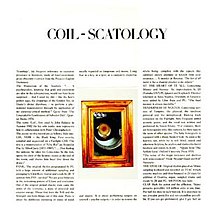
Throbbing Gristle were an English music and visual arts group formed in Kingston upon Hull by Genesis P-Orridge and Cosey Fanni Tutti, later joined by Peter "Sleazy" Christopherson and Chris Carter. They are widely regarded as pioneers of industrial music. Evolving from the experimental performance art group COUM Transmissions, Throbbing Gristle made their public debut in October 1976 in the COUM exhibition Prostitution, and released their debut single "United/Zyklon B Zombie" and debut album The Second Annual Report the following year. P-Orridge's lyrics mainly revolved around mysticism, extremist political ideologies, sexuality, dark or underground aspects of society, and idiosyncratic manipulation of language inspired by the techniques of William S. Burroughs.
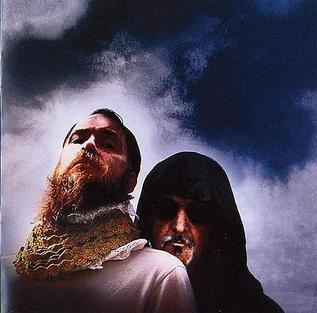
Coil were an English experimental music group formed in 1982 in London and dissolved in 2005. Initially envisioned as a solo project by musician John Balance, Coil evolved into a full-time project with the addition of his partner and Psychic TV bandmate Peter Christopherson. Coil's work explored themes related to the occult, sexuality, alchemy, and drugs while influencing genres such as gothic rock, neofolk and dark ambient. AllMusic called the group "one of the most beloved, mythologized groups to emerge from the British post-industrial scene."

Peter Martin Christopherson was an English musician, video director, commercial artist, designer and photographer, who was at one time a member of British design agency Hipgnosis.

Fixed is the second extended play (EP) by American industrial rock band Nine Inch Nails. It was released on December 7, 1992, by Nothing, TVT, and Interscope Records. It serves as a companion release to Broken (1992), and includes remixes by Coil, Danny Hyde, JG Thirlwell, and Butch Vig, as well as then-live band member Chris Vrenna.

Further Down the Spiral is a remix album by the American industrial rock band Nine Inch Nails. It is the companion remix disc to the band’s second studio album, The Downward Spiral, and was released on May 29, 1995, in two editions, one denoted as Halo 10, and the other as Halo 10 V2, each containing a different set of tracks.

James George Thirlwell, styled as JG Thirlwell and also known as Clint Ruin, Frank Want, and Foetus, among other pseudonyms, is an Australian musician, composer, and record producer known for juxtaposing a variety of different musical styles.

Geoffrey Nigel Laurence Rushton, better known under the pseudonyms John Balance or the later variation Jhonn Balance, was an English musician, occultist, artist and poet.

Time Machines is a 1998 studio album by English experimental group Coil, originally released under the one-off project alias Time Machines. The album was created under the premise of psychedelic drone pieces named after corresponding hallucinogenic drugs, "tested and retested" during the album's studio sessions for apparent narcotic potency. Main member John Balance also described the album as an attempt to create "temporal slips".

Horse Rotorvator is the second studio album by English experimental music group Coil, released in 1986.

"Panic" and "Tainted Love" are songs recorded by British experimental music band Coil. These were released in 1985 through Some Bizzare in the UK and Wax Trax! Records in the US respectively, as the band's first single, and the sole one from their 1984 debut studio album, Scatology. Originally released on twelve-inch vinyl discs, the single was regarded as the first AIDS benefit release, and has been reissued several times on compact discs.

Unnatural History is a compilation album produced by Coil, including tracks that originally appeared on various compilations and limited edition releases along with some previously unreleased material. The compilation contains material from 1983–1986, but was only released in 1990. It would become the first in a series of compilation albums with the releases of Unnatural History II and Unnatural History III.

Love's Secret Domain is the third studio album by the British experimental band Coil, released in 1991. The singles released from the album were "Windowpane" and "The Snow". Guest vocalists include Marc Almond on the song "Titan Arch" and Annie Anxiety on the song "Things Happen".

Gold Is the Metal (With the Broadest Shoulders) was the third album released by Coil, in the year 1987. It is not a proper follow-up to 1986's Horse Rotorvator, but more a collection of outtakes and demos from the Scatology, Horse Rotorvator and Hellraiser soundtrack sessions. Some obviously correspond to earlier and later released material ("Golden Hole" to "Penetralia", "...Of Free Enterprise" to "Herald", etc.), while others ("Boy in a Suitcase") do not appear anywhere else. "The Last Rites of Spring" includes a sample by Stravinsky, also used extensively in "The Anal Staircase".

Unnatural History III, subtitled Joyful Participation in the Sorrows of the World, is the third and final release in the Unnatural History series of compilation albums by British experimental band Coil. Unlike the compilations Stolen & Contaminated Songs and Gold Is the Metal with the Broadest Shoulders, the Unnatural History albums collect songs from more than one era of Coil's work.

How to Destroy Angels is the debut extended play by British experimental band Coil. At this point, the group consisted only of John Balance and Peter Christopherson. It was originally released in 1984 on L.A.Y.L.A.H. Antirecords, but was later re-pressed in 1988.

Megalithomania! is a live album by Coil recorded at their performance at the Megalithomania festival at Conway Hall in London, England. It is limited to a pressing of 230 copies, 123 of which were available in their box set The Key to Joy Is Disobedience.
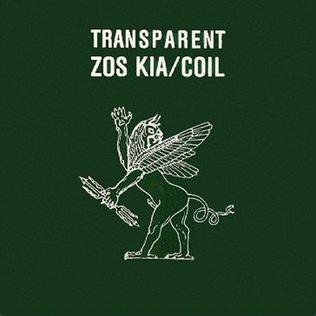
Transparent is a collaborative release by the bands Zos Kia and Coil.
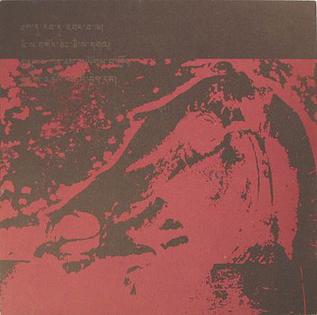
Nightmare Culture is a 12" split vinyl EP by Current 93 and Sickness of Snakes, which was John Balance and Peter Christopherson from Coil and Boyd Rice.

Force the Hand of Chance is the debut studio album by English experimental group Psychic TV, released in 1982 by record label Some Bizzare. The first 5,000 pressings came with a bonus album, Themes.
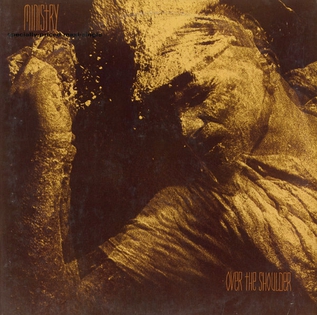
"Over the Shoulder" is a song by American industrial band Ministry, from their second studio album, Twitch (1986). Written by frontman Al Jourgensen, produced by Adrian Sherwood, and released in November 1985 as a 12-inch single, it was the band’s first recording after signing with Sire Records; the accompanying music video was directed by Peter Christopherson.
